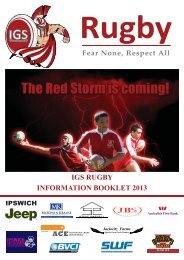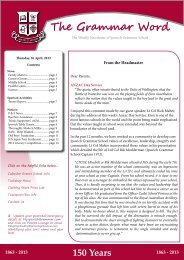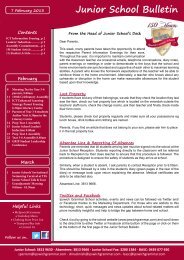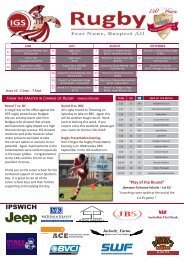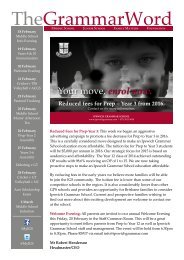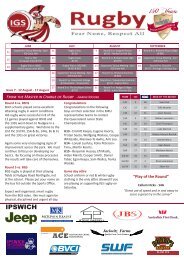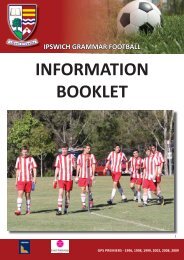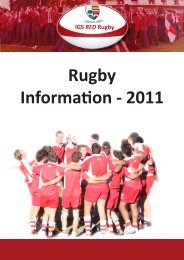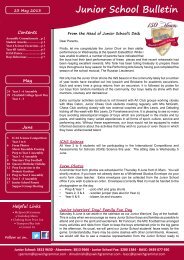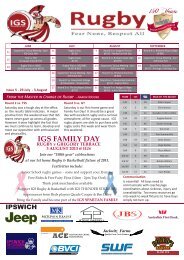Boarding House Routines (Continued) - Ipswich Grammar School
Boarding House Routines (Continued) - Ipswich Grammar School
Boarding House Routines (Continued) - Ipswich Grammar School
Create successful ePaper yourself
Turn your PDF publications into a flip-book with our unique Google optimized e-Paper software.
Living Away From home<br />
For many, going to boarding school is the first time they have spent any significant amount of time away from their<br />
home, their family and their friends. Below are a number of issues that you might like to discuss with your son so<br />
that he is prepared in some way for the change. There are also a number of independently motivated life-skills that a<br />
new boarder must be proficient in if they are to make a speedy and pleasant transition to boarding.<br />
Some suggested personal skills needed are:<br />
1. Appropriate socialising and mixing skills with peers<br />
2. The best way to organise study times and achieve set study goals<br />
3. Picking up and putting away, as well as the organisation and caring of one’s belongings; e.g. how to fold casuals<br />
neatly and pair socks<br />
4. A little knowledge of sewing such as buttons, name tags and simple hems would be beneficial<br />
5. The ability to make a bed in a neat and tidy manner<br />
6. The structuring of leisure time in such a way as to avoid getting bored or having little to do<br />
7. The budgeting of funds<br />
8. The ability to work well in a small group situation e.g. assisting with supper distribution and clean up.<br />
These last three are often major problems experienced by new boarders, and of course are rather difficult to cope with,<br />
especially for younger boys. The boarding staff gives guidance in these matters, but it would be much easier for your<br />
son during the settling in period if some basic preparation has been given at home.<br />
Many young people experience difficulty adapting to living in dormitories, especially in relation to the number of<br />
other people continually surrounding them. The following are issues that you could discuss with your son that may<br />
help prepare him for the different living situation.<br />
• Personal hygiene - it is essential that all boarders know the importance of showering daily, changing underwear<br />
and socks regularly, using clean linen and towels, hanging towels appropriately to air and dry, the need for soap,<br />
toothpaste, shampoo and deodorant. Without this knowledge it is possible that a boarder may be ostracised by<br />
his peers, creating a very difficult situation for both the boy as an individual and residential community members<br />
in general. Guidance and help is given whenever possible by the residential staff but an awareness of this before<br />
they commence boarding would help avoid any potential problems.<br />
• Physical and psychological changes - younger students should be prepared for the physical and psychological<br />
changes they will experience during adolescence, so that they are familiar with, and not surprised by, what will<br />
happen.<br />
• How to deal with routine - just as dealing with the routine of working lives for adults can be stressful, dealing with the<br />
day-to-day routine of boarding life can be difficult for some boarders. It would be helpful to talk over with your son<br />
how the routine can work to his advantage and also strategies for coping with that routine.<br />
• Academic expectations - often boarders coming from other schools, especially smaller schools, at first may find<br />
the academic program of a bigger school difficult or daunting. It helps if both you and your son have discussed<br />
what appropriate expectations and goals both of you have so that boarders don’t hold an unrealistic idea of what<br />
they are expected to achieve.<br />
• The reason for changing schools and entering boarding- it is important that your son knows why he is entering<br />
boarding and is aware of the opportunities offered by <strong>Ipswich</strong> <strong>Grammar</strong>.<br />
26 – IPSWICH GRAMMAR SCHOOL Boarders’ Handbook



